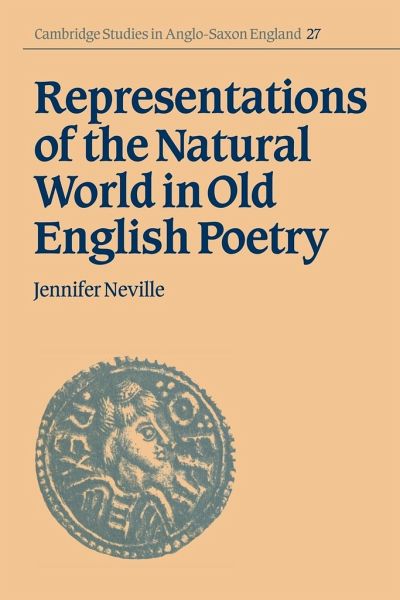
Representations of the Natural World in Old English Poetry
Versandkostenfrei!
Versandfertig in 1-2 Wochen
59,99 €
inkl. MwSt.
Weitere Ausgaben:

PAYBACK Punkte
30 °P sammeln!
Reveals how Anglo-Saxons viewed and defined themselves through the descriptions of nature in their poetry.This book examines descriptions of the natural world in a wide range of Old English poetry. Jennifer Neville describes the physical conditions experienced by the Anglo-Saxons - the animals, diseases, landscapes, seas and weather with which they had to contend. She argues that poetic descriptions of these elements were not a reflection of the existing physical conditions but a literary device used by Anglo-Saxons to define more important issues: the state of humanity, the creation and maint...
Reveals how Anglo-Saxons viewed and defined themselves through the descriptions of nature in their poetry.
This book examines descriptions of the natural world in a wide range of Old English poetry. Jennifer Neville describes the physical conditions experienced by the Anglo-Saxons - the animals, diseases, landscapes, seas and weather with which they had to contend. She argues that poetic descriptions of these elements were not a reflection of the existing physical conditions but a literary device used by Anglo-Saxons to define more important issues: the state of humanity, the creation and maintenance of society, the power of individuals, the relationship between God and creation and the power of writing to control information. Examples of contemporary literature in other languages are used to provide a sense of Old English poetry's particular approach, which incorporated elements from Germanic, Christian and classical sources. The result of this approach was not a consistent cosmological scheme but a rather contradictory vision which reveals much about how the Anglo-Saxons viewed themselves.
Review quote:
'One of the major strengths of Representations of the Natural World in Old English Poetry is Neville's ability to convey a consistent account of the Anglo-Saxon Weltanschauung, without systematising, or making overly rigid, this view.' Studia Neophil
Table of contents:
Acknowledgements; List of abbreviations; 1. Introduction: defining the natural world; 2. Defining and confining humanity; 3. Constructing society: outside and inside, powerlessness and control; 4. Standing outside, standing out: defining the individual; 5. Representing God: power in and against nature; 6. Enclosing the natural world, knowledge and writing; 7. Conclusion; Bibliograhy; Index.
This book examines descriptions of the natural world in a wide range of Old English poetry. Jennifer Neville describes the physical conditions experienced by the Anglo-Saxons - the animals, diseases, landscapes, seas and weather with which they had to contend. She argues that poetic descriptions of these elements were not a reflection of the existing physical conditions but a literary device used by Anglo-Saxons to define more important issues: the state of humanity, the creation and maintenance of society, the power of individuals, the relationship between God and creation and the power of writing to control information. Examples of contemporary literature in other languages are used to provide a sense of Old English poetry's particular approach, which incorporated elements from Germanic, Christian and classical sources. The result of this approach was not a consistent cosmological scheme but a rather contradictory vision which reveals much about how the Anglo-Saxons viewed themselves.
Review quote:
'One of the major strengths of Representations of the Natural World in Old English Poetry is Neville's ability to convey a consistent account of the Anglo-Saxon Weltanschauung, without systematising, or making overly rigid, this view.' Studia Neophil
Table of contents:
Acknowledgements; List of abbreviations; 1. Introduction: defining the natural world; 2. Defining and confining humanity; 3. Constructing society: outside and inside, powerlessness and control; 4. Standing outside, standing out: defining the individual; 5. Representing God: power in and against nature; 6. Enclosing the natural world, knowledge and writing; 7. Conclusion; Bibliograhy; Index.




